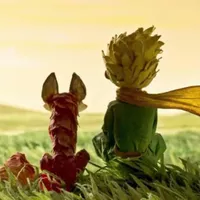18 - ΚΕΦΑΛΑΙΟ XVIII / XXVII
|Chapter 18|
18 - KAPITEL XVIII / XXVII
18 - CHAPTER XVIII / XXVII
18 - CHAPITRE XVIII / XXVII
18 - CAPÍTULO XVIII / XXVII
ΚΕΦΑΛΑΙΟ XVIII
KAPITEL XVIII
CHAPTER XVIII
Ο μικρός πρίγκηπας, διασχίζοντας την έρημο, συνάντησε μοναχά ένα λουλούδι.
|||traversant||||seulement||
|||crossing||desert|met|only||
|||door de woestijn kruisend|||ontmoette|||
|||überquerend||Wüste||nur||
Der kleine Prinz, der die Wüste durchquerte, traf nur eine Blume.
The little prince, crossing the desert, met only one flower.
Ένα λουλούδι με τρία πέταλα, ταπεινό και ασήμαντο...
|||||humble||insignifiant
|||||humble||insignificant
|||||bescheiden||onbelangrijk
|||||umile||insignificante
|||||bescheiden||unbedeutend
Eine Blume mit drei Blütenblättern, bescheiden und unbedeutend...
A flower with three petals, humble and insignificant...
- «Καλημέρα» του είπε ο μικρός πρίγκηπας.
- "Good morning" the little prince said to him.
- «Καλημέρα», απάντησε το λουλούδι.
- "Good morning," answered the flower.
- «Που είναι οι άνθρωποι;», ρώτησε ευγενικά ο μικρός πρίγκηπας.
|||||höflich|||
|||||politely|||
- "Where are the people?" asked the little prince politely.
Το λουλούδι, είχε δει κάποτε ένα καραβάνι να περνά:
||||||un caravan||
||||"once"||caravan passing by||"passing by"
||||||karavaan||voorbijgaan
||||||carovana||
Die Blume hatte einmal eine Karawane vorbeiziehen sehen:
The flower had once seen a caravan pass by:
- «Οι άνθρωποι; Υπάρχουν, νομίζω, έξι - επτά.
- "Menschen? Es sind, glaube ich, sechs oder sieben.
- "People; There are, I think, six or seven.
Τους είχα δει πριν χρόνια.
|||"years ago"|
Ich habe sie vor Jahren gesehen.
I had seen them years ago.
Κανείς όμως δεν ξέρει που να τους βρει.
no one|||||||
Aber niemand weiß, wo sie zu finden sind.
But no one knows where to find them.
Χάνονται σαν τον άνεμο.
|||Wind
They disappear|||wind
verliezen|||
|||vento
Sie sind verloren wie der Wind.
They are gone like the wind.
Δεν έχουν και ρίζες... κι' αυτό πρέπει να τους ταλαιπωρεί πολύ».
|||||||||les dérange|
|||roots||||||troubles|
|||||||||talen|
||||||||loro||
|||||||||talioporeiert|
Sie haben keine Wurzeln... und das muss sehr lästig sein."
They don't even have roots... and that must bother them a lot."
- «Αντίο», του είπε ο μικρός πρίγκηπας.
|||||prince
- "Auf Wiedersehen", sagte der kleine Prinz.
- "Goodbye," the little prince said to him.
- «Αντίο», αποκρίθηκε το λουλούδι
|answered||
- "Goodbye," answered the flower

